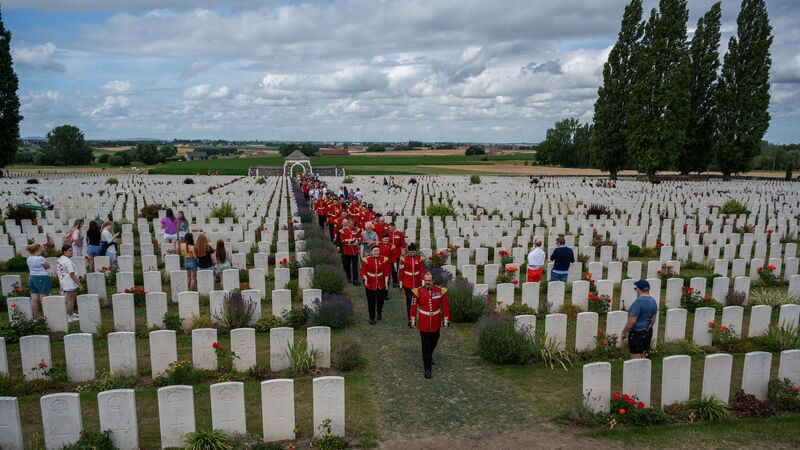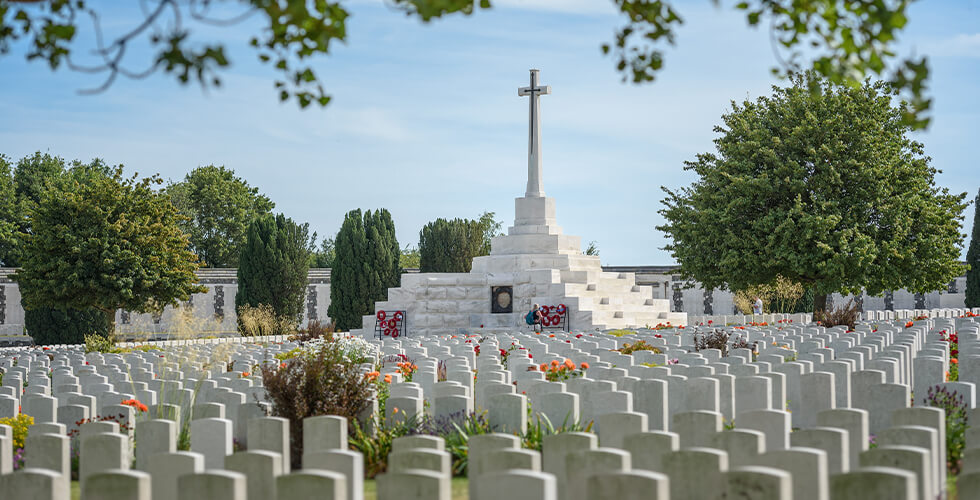29 December 2022
The history of The Last Post
Every evening in the historic city of Ieper, a stillness emanates from below the iconic Menin Gate, home of the nightly Last Post ceremony. Discover more about the Last Post history and why this incredible ceremony endures more than 100 years after the end of World War One.

Buglers at the Last Post - Last Post Association
The Last Post origins
From its origins as a simple bugle call, the Last Post has developed into one of the most enduring, universal symbols of remembrance.
What is the Last Post?
The Last Post is a short musical call traditionally played on a bugle, but can also be played on a trumpet.
Historically used by the British Army, in a time before wrist watches, to signify to its soldiers that it was time to stand down for the day, it is now commonly used as part of a remembrance service or other commemorative events.
As well as at Remembrance events, the Last Post is also played daily for its original use. At the Tower of London, the Ceremony of the Key is performed every night when the gates of the historic fortress are locked for the evening. The gates are locked at the stroke of 10 pm each evening, and the Last Post is sounded.
When is the Last Post played?
The Last Post is often played at Remembrance services, such as Armistice Day and Remembrance Sunday events, and at military funerals.
It is also played every evening in Belgium, under the CWGC’s Menin Gate memorial in Ieper, by members of The Last Post association, who have held a short remembrance service there every evening since 1928.
When was the Last Post written?
The words that accompany the Last Post - known as The Exhortation - come from For the Fallen, a remembrance poem by Laurence Binyon.
For the Fallen was first published in The Times in September 1914 as the first British troops began to fall on the Western Front. Unlike later war poetry, Binyon does not dwell on the horrors of war, but instead the glory and sacrifice of those that died.
The Exhortation is taken from one of the middle stanzas of the poem:
They shall grow not old, as we that are left grow old,
Age shall not weary them, nor the years condemn.
At the going down of the sun, and in the morning,
We will remember them.

Copy of the Last Post Exhortation - Eric Compernolle
When was the Last Post first used?
Many armies throughout history have used music as a means of communication, from drum beats to keep time while marching to trumpet calls to signify manoeuvres.
The Last Post was published in the British Army in the 1790s as part of an array of calls that would instruct the British soldier day to day. Reveille signals the start of the day and roll call, and the First Post would signify the end of the day, as it would sound when the duty officer would begin his inspection of sentry posts around a camp.
Once the sentry posts were manned and the final post had been inspected, the regimental bugler would play the Last Post signifying that the camp was closed for the night.
During the 19th Century the Last Post began to take on a new role, played to mark the fallen in conflicts like the Boer War, so by the time World War One started, it had become ingrained in public consciousness as a sound of Remembrance.
Who composed the Last Post music?
The Last Post was formally published in the British Army in the 1790s, but the name of the composer seems to be lost to history.

Want more stories like this delivered directly to your inbox? Sign up for our newsletter for regular updates on the work of Commonwealth War Graves, blogs, event news, and more.
Sign UpThe Last Post and Remembrance
Today we associate the Last Post with Remembrance, and at commemorative services and ceremonies across the world, the Last Post is played or performed.
The Last Post and WW1
By the advent of World War One, the use of the Last Post to remember the war dead had become a recognised part of commemoration for the war dead. During the war it was played at military funerals both on the battlefields and at home.
It has since become an established part of Armistice Day and Remembrance Sunday events across the Commonwealth, marking the start of the traditional two minute silence, and at other remembrance events like ANZAC Day.

ANZAC Day Last Post serive - Last Post Association
The Last Post for Remembrance Day
Today the Last Post often marks the beginning of the traditional minute silence, harking back to its origins as a time for peace and stillness.
What is the Last Post ceremony?
From football matches to Remembrance Sunday, the playing of the Last Post has become a traditional part of remembrance services around the world, usually to commence the minute silence, which is often ended with the playing of Reveille.
The Last Post ceremony can be performed in isolation, as it is at the Menin Gate, or can form part of a wider remembrance service, such as at Remembrance Sunday events at the Cenotaph in London.
How long does the Last Post ceremony last?
The Last Post ceremony at the Menin Gate usually lasts about 10 minutes - although the duration depends on the number of participants.
It begins with the playing of the Last Post followed by the Exhortation and the traditional minutes silence. Wreaths are then laid by any visiting organisations and the buglers sound Reveille to signal the end of the ceremony.
For special events like Remembrance Sunday and important war anniversaries, special versions of the Last Post ceremony are held, which include extra elements. Often heads of state and other dignitaries will attend a Last Post ceremony, taking the opportunity to lay a wreath or to speak the Exhortation.
Last Post Ceremony at the Menin Gate
The Last Post at the Menin Gate Memorial, in the city of Ieper, is held every evening at 8pm.
The main road under the gate is closed each evening, allowing locals and visitors to gather under the memorial for the ceremony. The ceremony itself is organised by the Last Post Association who have held the ceremony every evening since 2 July 1928, aside from the period when Belgium was under German control during World War Two. During this period, a similar Last Post Ceremony was held at Brookwood Military Cemetery in Surrey, England.
The first Last Post at the Menin Gate was sounded by the buglers of the 2nd Battalion, Somerset Light Infantry during the inauguration of the memorial in 1927. Today it is sounded by members of the Last Post Association wearing the uniforms of the local volunteer fire brigade, of which they are required to become members.

Unveiling of the Menin Gate in 1927
Today the Last Post in Ypres continues, in part as a thanks to the Allied soldiers who gave their lives on the Ypres salient during World War One, but also to commemorate all those that fell in the war - a light on Europe’s history, but also a celebration of our current unity.
Why is The Last Post Ceremony at Ypres?
For the majority of World War One, the frontlines cut from the Belgian coast, through the Flanders region of Belgium, and across the border into France. One of the main Allied strongpoints on the line was the historic city of Ypres.
The battlefields of the Ypres salient saw some of the bloodiest fighting of the war, including the infamous Third Battle of Ypres - also known as the Battle of Passchendaele.
The human cost of these battles was incredible, and the city was levelled by German artillery. The city, including the historic Cloth Hall and cathedral was painstakingly rebuilt, but the lives lost on the Belgian battlefields could not be easily replaced.
Instead, Flanders is now home to some of our most famous memorials and biggest cemeteries - including our largest anywhere in the world, Tyne Cot Cemetery. The Belgian people formed a special bond with the Allied forces, some of whom came halfway around the world to fight for their freedom. The nightly act of remembrance is just one way in which the people of Ieper pay tribute to the fallen.
As well as the Last Post and the Ypres Menin Gate Memorial, Ieper is home to a myriad of other cemeteries, memorials, museums and exhibits that tell the story of World War One in Belgium. Discover more and visit the CWGC in Ieper.
Remember their sacrifice - read stories and support the CWGC


